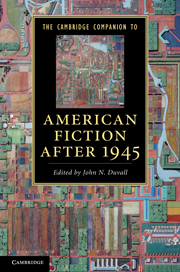Conclusion: Whither American fiction?
Published online by Cambridge University Press: 28 March 2012
Summary
The death of the book is good for literature. At least, one can draw this conclusion from contemporary American fiction. The threat or promise of an increasingly paperless society prompts innovation through interaction with digital technologies and, as a result, reinvigorates literature in both print and digital formats. To assess where American fiction is and where it is going, I examine a few case studies of recent print and digital literature that share a commitment to pushing literature's boundaries by experimenting with its media. My focus is cutting-edge, avant-garde literature because these works blaze the paths others will follow. Instead of withering away, such works show how fiction finds new sources of inspiration in and from digital technologies and networked reading practices. So, at the intersections of new media and traditional literary practices, whither American fiction?
An examination of recent literary engagements with the digital exposes two significant trends: fiction that embraces new media to experiment with ways of representing digitality, and fiction that retreats from the digital through acts of aestheticizing and fetishizing the printed book. These trends are not opposites but are mutually dependent, and their dialectical relationship, I argue, revolves around the concept of remediation. Jay David Bolter and Richard Grusin define remediation as “the representation of one medium in another,” and they see remediation as “a defining characteristic of the new digital media.”
- Type
- Chapter
- Information
- The Cambridge Companion to American Fiction after 1945 , pp. 256 - 264Publisher: Cambridge University PressPrint publication year: 2011

